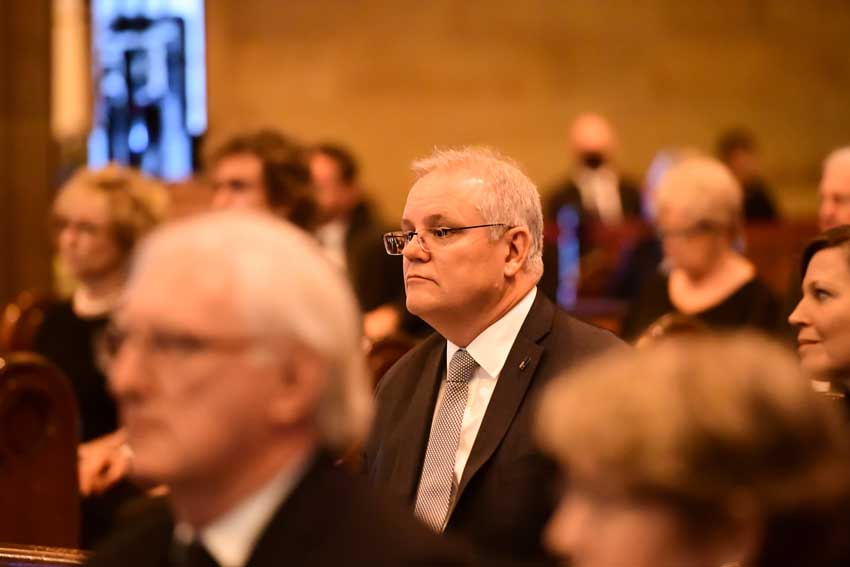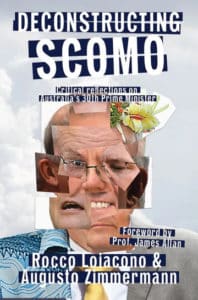
After two terms, Scott Morrison’s “supposedly centre-right government has not enacted a single major reform that its constituency can be proud of”, because the Prime Minister has political instincts that are “always inherently authoritarian”, two prominent conservative legal academics have written in a stinging election-time rebuke to the Coalition.
Dr Rocco Loiacono and Professor Augusto Zimmermann – two Western Australian legal academics, Christians and contributors to Quadrant, The Spectator Australia and other conservative publications – describe Mr Morrison as a hollow man with a “notorious disregard for freedom” in their new book, Deconstructing ScoMo.
The authors single out Mr Morrison’s support for Labor-led lockdowns and pandemic health orders, and his failure to produce viable religious freedom legislation, as two significant signs that the Liberal Party has drifted from its core identity.

“Any time the Australian Labor Party gets in government or the left are in power, they spend every waking moment implementing their agenda,” Dr Loiacono told The Catholic Weekly.
“For the last eight and a half years the Coalition has done nothing to implement its agenda. It’s all about the maintenance of power for that sake.”
Mr Morrison, unlike previous prime ministers, did not have “an acute interest in politics in his youth”, and as a result is attached more to the “politics of politics” within his own party rather than to any foundational principles, they say.
By contrast, the authors claim, great conservative leaders are instinctively drawn to prefer free speech, free assembly and other fundamental individual rights.
“That‘s why they call him ‘Scotty from Marketing’. He’s great at the punchline,” Dr Loiacono said.
Religious Freedom is a free speech issue
One such punchline the authors reach for often is a 2017 Morrisonism for the ages: “Free speech doesn’t create one job, doesn’t open one business, doesn’t give anyone one extra hour.”
But by pursuing a religious freedom bill within the framework of anti-discrimination law rather than on free speech grounds, Mr Morrison insinuated that Christians were “special people who deserve some kind of protection for their bigotry” and set himself up to fail, Professor Zimmermann told The Catholic Weekly.
“Religious people don’t want to discriminate. They want to have freedom!”
“One of the most essential elements of a free and pluralistic society is to give associations and religious bodies the right to employ the people that are more in accordance with the ethos of the organisation, and to live according to their own choices.”
The Religious Discrimination Bill failed, Professor Zimmermann said, because it combined elements of a blasphemy law with measures drawn from a “socialistic worldview”, such as a religious discrimination commissioner.
“Can you imagine if that is then sent to a liberal member of the Uniting Church who supports same-sex marriage and other things traditional Christians do not support? This is going to potentially backfire,” he said.
Instead, the authors recommend the Liberal Party returns to its roots in free speech, and propose a ‘Restoration of Freedoms Act’ that would “re-calibrate the relationship between the conflicting human rights … [and restore] free speech and freedom of association for all” without implying that freedom of religion is “an inferior or secondary right”.
PM “inherently authoritarian”, authors say
They don’t think it’s likely that such a move could take place under Mr Morrison, because “the Prime Minister’s first instincts are always inherently authoritarian”. By this, Professor Zimmermann means Mr Morrison’s instinctive “feelings” are “not comfortable with classical liberal values”.
He gives the example of the trial of Cardinal George Pell, during which Mr Morrison proposed to strip the Cardinal of his Order of Australia after his unsuccessful appeal in the Victorian Court of Appeal.
“That is an authoritarian inclination, because he didn’t have regard for due process of law, nor regard that a person can be innocent until finally proven guilty,” Professor Zimmermann said.
The authors give other examples where Mr Morrison’s preference was to intervene in an “authoritarian” way: his support for adding his voice to the criticism of Israel Folau and restricting the right of Katherine Deves to “prosecute the case” on gender issues in the context of the election campaign.
Dr Loiacono says Deves, “very articulate”, should be “let loose” to argue for biological gender – “which the vast majority of Australians I’m sure would agree with.”
The Coalition should say, “‘We stand for these mainstream values,’ instead of walking around on eggshells,” he said.
Is the Liberal Party as “broad church” as it once was?
Much like the soul-searching occuring within the US Republican Party in the wake of the Trump presidency, the authors think the Coalition will suffer a crisis of conscience, during which it must rediscover its attachment to liberalism and individual rights.
Dr Loiacono points to one such sign: the growth of minor parties on the right wing of politics, which shows the Coalition’s “broad church” isn’t as broad as it once was.
John Ruddick and former QLD Premier Campbell Newman, two ex-Liberals now running for the Liberal Democrats, show they are “trying to be what the Liberal Party used to be, the party of both Edmund Burke and John Stuart Mill”, he said.
Professor Zimmermann publicly resigned from the Liberal Party in 2021 over COVID-19 public health orders. Dr Loiacono ended his affiliation with the Liberal Party after the ouster of Tony Abbott from the Prime Ministership.
Deconstructing ScoMo is available from http://www.lockepress.com
